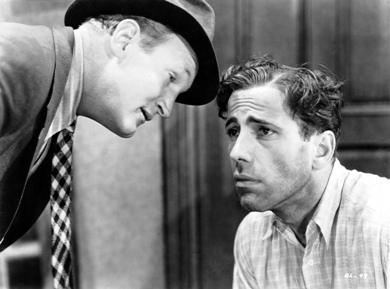 In 1937, Warner Brothers released a film attacking the rise of hate groups in America that were terrorizing immigrants and minorities. Humphrey Bogart stars in this extraordinary movie.
In 1937, Warner Brothers released a film attacking the rise of hate groups in America that were terrorizing immigrants and minorities. Humphrey Bogart stars in this extraordinary movie.
After the Second World War, a lot of what had been happening in the U.S. before the war was swept under the rug and forgotten. Nazism and fascism were seen as things that happened in Germany and Italy, an evil that caused the rest of the world to unite in order to defeat it. But the fact is, these political movements had supporters in just about every country in Europe, and the United States. Antisemitism was pretty mainstream, and the rhetoric from such prominent men as Charles Lindbergh and Henry Ford was in line with what Hitler was saying. The color line was absolutely in force as well—black Americans were segregated off from white society in every important respect.
But for the most part, the movies ignored all that, presenting a world of adventure, comedy, dancing, music, and escapism to audiences during the Depression. Political topics were discouraged, both by the powerful forces in American society and the studios themselves, that didn’t want to disturb people, because that could potentially drive them away from movies, thus not spending the money in theaters that kept Hollywood going. Among the studios, however, Warner Brothers was something of an exception. Their stories were aimed more at working people in the cities, and they produced a lot of social problem pictures such as Dead End and I Was a Prisoner on a Chain Gang. One of the most unusual of such films, released in 1937 and directed by Archie Mayo, was called Black Legion.
Humphrey Bogart plays a factory worker named Frank Taylor, happily married with kids, who is expecting and looking forward to a promotion, when he can provide better support for his family. But to his shock and surprise, he gets passed over for this promotion by someone with a Polish sounding name, an immigrant who has worked hard and stayed up nights learning the business. While he simmers with resentment, a co-worker tells him about a secret vigilante group called The Black Legion, that commits violent acts against foreigners and immigrants who they say are stealing American jobs. If you join them, he is told, you must pledge total secrecy and loyalty to the Legion. Frank agrees to join, and when the Legion meets we see that they wear hoods and practice cult-like loyalty ceremonies. They get rid of Frank’s rival and thanks to them, he gets the promotion. But the Legion’s demands on his loyalty end up putting a strain on his relationship with his wife and best friend. If you’re expecting a simplistic happy outcome here, the film presents a bracing and uncomfortable reality instead.
Bogart hadn’t yet become the big star he would be in the ‘40s. He was mostly doing supporting roles, often as villains. Although he’s kind of a villain here too, he plays the main character, and the drama consists in his inner struggle between his decent impulses and the hatred against other groups that gradually takes over his mind and heart. It’s a very effective performance.
The story, by Robert Lord, was inspired by an actual anti-immigrant group in Michigan. But there are pointed similarities to the Ku Klux Klan as well. The Klan had become a powerful and widely accepted group in America, and it actually sued Warner Brothers because the movie used a Klan symbol in one of the scenes, but a judge threw out their case. There’s no mention of Jews or Blacks in the film—there were things you just couldn’t say in those days and be accepted in the mainstream of the entertainment industry. But the implications are clear, and watching this now is kind of scary because of the relevance to our current situation. We see Bogart’s character undergo a disturbing change from being a part of this cult-like organization, and this is the kind of thing we’re seeing in the United States today. It’s a significant detail that the Legion in the film targets foreigners and immigrants. Every fascist movement in history begins by attacking immigrants. It’s an easy way to scapegoat a powerless group in order to win the support and votes of people who are angry about their economic situation. In the film, we see that the people leading the Legion are wealthy, and spend a great deal of time planning how to make money from the group’s hate campaigns.
The screenplay gets a little preachy at the very end, but overall this is a very impressive piece of work that was way ahead of its time. I don’t remember seeing Black Legion shown on TV when I was a kid—maybe it was, but it must have been rare. It surprised me that a movie from the 1930s would be so brutally frank and relevant regarding the malicious political influences of that time, similar in so many ways to the forces threatening our democracy right now.

Saint Frances tells of the friendship between an insecure young woman and the 6-year-old for which she is employed as a nanny, while The...

Tom Cruise stars as a real-life pilot who got caught up and in the dangerous, but lucrative, business of running weapons and cocaine in...

Michael Powell’s 1948 drama, about a ballerina torn between love and career, is possibly the most visually beautiful ever made. If one were asked...